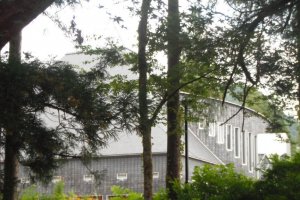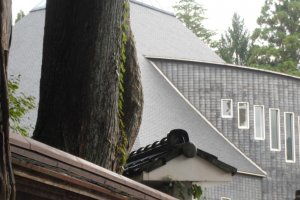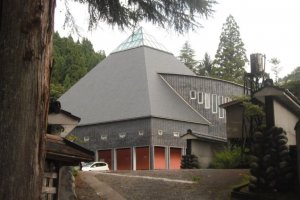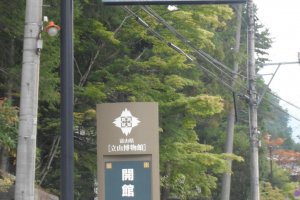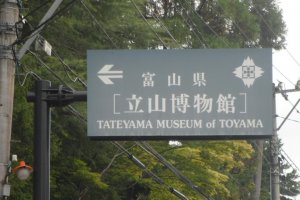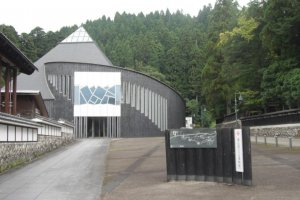While visiting Oyama Jinja and the sites of Nunobashi at Ashikuraji, drop in to Tateyama Museum for some interesting insights into the natural and cultural history of this amazing area.
The building itself is of interesting architecture, and is situated back from the road into the forest, adjacent Oyama Jinja.
You follow a set walking tour through the building – in fact the whole museum experience is part of three actual facilities, and you can enter with individual tickets or buy one ticket covering all at a discounted price. If you are planning to do this, then the museum is really the best one to start with.
Your journey begins on the third floor. Following the floor around you will see aspects of the natural environment – some displays of the plants and animals of the region. There are also displays of the geology and information regarding the natural disasters that occurred in 1858 and 1891, leading to the major erosion control research and works in the Tateyama Caldera (see my story on the Sabo Museum for more information).
Walk down to the second floor to learn more about the spiritual history if the area. I have talked about different aspects of the Shugendō Mountain Religion that was prevalent in this area. You can actually see some artefacts and different versions of the Tateyama Mandara. There is a lovely model of the Nunobashi Kanjou, and representation of how Amida appeared to Saeki in the bear’s cave.
On the first floor you can watch a number of short videos relating to the legends and landscapes of the Tateyama caldera region. There are a number of different versions of the Saeki story which I mentioned in the story about Oyama Jinja, and one is included here for you to view as an animation. Also on the first floor you may see different exhibitions of historic art works throughout the year.
As I mentioned above you can continue on from here to see the Enmado or Enma Temple and walk over the Nunobashi. At the site of the Ubado or Ubagami (the special meditation and ritual hall, which is sadly no longer there), is a dome-shaped cinema where you can recline on comfortable tatami and watch beautifully filmed and time lapse photography of the natural wonders of the area over a year. This film takes one hour to watch. When it is finished, the wall on which the screen is faces Tateyama which roles up to reveal the sacred mountain, just as women did in olden times at the end of the Nunobashi ceremony.
I think this museum is well-worth seeing. It is very well laid out and neither over- or under-done, just giving a nice, brief but concise insight into the area – and you can go find out more if you want to, as I have done since I first started visiting this area!
Getting there
Car
If you have a car, it is very easy to drive to Ashikuraji Oyama Jinja. Just follow the major road route 43 from Toyama JR station nearly all the way to the Jinja. The road roughly follows the Dentetsu local train line. At Daisenji , the train stop before Iwakuraji , route 43 takes a turn to the left, over a level train crossing. Continue on straight ahead (don’t turn) over the Joganji River, past Iwakuraji Oyama Jinja, and follow the signs to Tateyama, turning onto road 67. It is another 15km further on from Iwakuraji, and is on your left as you go through the village of Ashikuraji.
Train
Catch the train to Chigaki on the Dentetsu line. The Dentetsu private train lines all go from Dentetsu Toyama station, adjacent to JR Toyama station. There are four lines, and to get to Chigaki you take the line for Tateyama, via Terada. The trip takes about 48 minutes and costs ¥990, and there is roughly one train every hour (check the Hyperdia website for the timetable).
Bus
From Chigaki there are two options. A local bus runs along the valley from right outside Chigaki station and there is a stop right across the road from Oyama Jinja. Buses are only about one an hour. It is actually only about 2km and it is a very pleasant walk along the road number 67. It is slightly uphill but the gradient is low.


